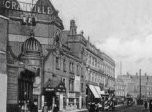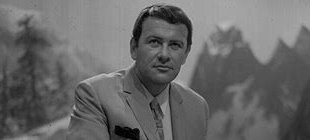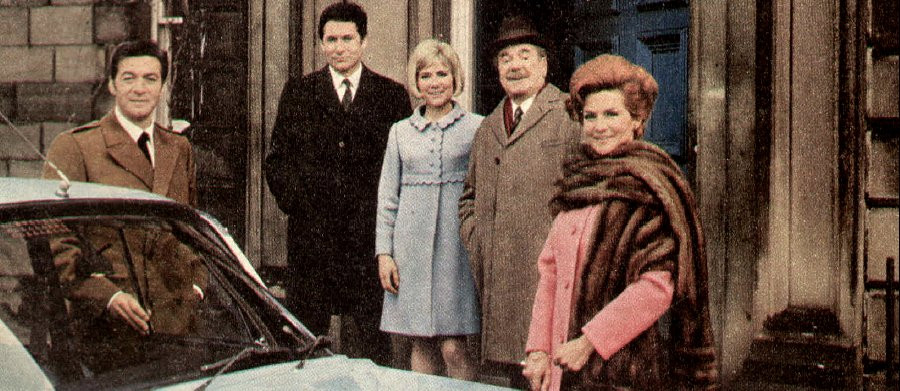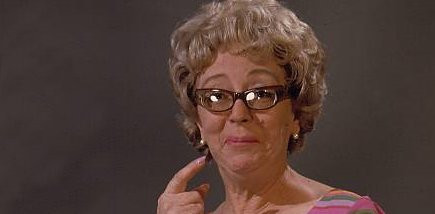
Father Brown 2013
The sleuthing cleric created by GK Chesterton in the early part of the 20th century.
My wife had just finished her Sudoku.
'Was it hard?' I asked her.
'It was about as challenging as an episode of Father Brown', she replied.
Ignoring my wife's Sudoku-induced smugness, I can't really disagree that it was an apt simile to use to describe Father Brown. First shown on BBC, in the 2.15 slot on a weekday afternoon, it can also be seen on iPlayer, Alibi and YouTube so there's no excuse not to watch it. The programme provides good, escapist fare and, more importantly, replaces the void in pious crime fighting that has filled my TV screen since the demise of Father Dowling Investigates.
The series takes me back to my days as an earnest Catholic lad who would never miss Mass and was a regular in the Confessional box. I haven't been to Mass in years but some rituals are hard to shake off. Before the start of each episode I find myself reciting the Lord's Prayer, making the sign of the cross and lighting my wife's Yankee candles. This annoys my wife because, as she points out, Yankee candles are not cheap.
Father Brown reminds me of our old parish priest. He was also a TV star. By this I mean that he once made an appearance on the Epilogue. I miss the Epilogue. It was from a time when the television schedules had a beginning, a middle and an end. Now they just roll on aimlessly, forever and ever, amen. I don't know if parish priests still do their rounds by bicycle but our parish priest certainly did. He would zero in, like a stealth bomber, on unsuspecting households, usually around tea time. During the dark winter months, he would be lit up like ICI at Christmas and he could be seen coming a mile off.
This gave us just enough time to lock the doors, close the curtains and pretend to be out. Not very Christian-like, I know, but it gave us something to talk about when Confession time came around again. There are few things more embarrassing than stony silence in a Confessional box.
Father Brown does his cycling around the more picturesque environs of rural Gloucestershire. The village of Kembleford is one of those picture postcard places where the sun beats down endlessly and bounces off the golden sandstone to create a warm amber glow. I should imagine the Cotswolds division of Gloucestershire county council has a dedicated office charged with fielding enquiries from TV crews hoping to use their country lanes to create some unchallenging, feel-good television.
It's only the more gritty, down to earth productions that wish to make use of Teesside and south Durham landmarks. Inspector George Gently and Vera can sometimes be seen patrolling the Headland at Hartlepool or asking sunny Seaton Carew to help with their enquiries. The viewer can easily recognise this worthy seaside town by its lovely art deco bus terminus and matching clock tower. Going further back, and further north, Michael Caine met his end in Get Carter among the coal conveyors of coastal Seaham. It's a suitably bleak ending for Jack Carter but that'll teach him to reverse the charges on Britt Ekland.
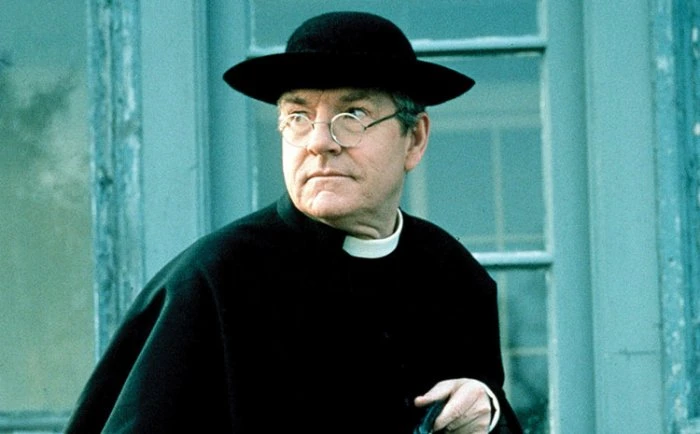
Father Brown has had various guises over the years. I am too young to remember the ITV series from 1974 starring the great Kenneth More but I do remember watching the film version, made in 1954, when Channel 4 showed it one Sunday evening a few years ago. This starred Alec Guinness as the eponymous priest. I know it is a heresy worthy of ex-communication but I have never been much of a fan of Mr Guinness. I don't know why this is because he is a perfectly good actor, though I am not sure I ever believed his oft-told tale of James Dean, the Porsche Spyder and the premonition. I have always been more a fan of Peter Finch, who plays Flambeau in the film, and I think I would have viewed the film to watch him in action rather than Alec Guinness.
Mark Williams plays the Father in these instalments. Acting-wise, he is not in the same league as Messrs Guinness and More. He lacks the solemnity to pull off a Requiescat in Pace with conviction and tends to suggest eccentricity by gazing into the distance with a smile of delirium on his face. Nevertheless, he depicts the Father as a likeable, mischievous presence.
The sleuthing cleric was created by GK Chesterton in the early part of the 20th century. This series has been developed by Rachel Flowerday and Tahsin Guner so I assume it is they who made the wise decision to set the stories in the early 1950s. It's standing room only on board the nostalgia bus but Father Brown hops on and finds a space between WPC 56, the Indian Doctor and legions of midwives.
They could have chosen to set the show in the 1940s but, by choosing the next decade, they have avoided the trap into which The Sullivansfell. I yield to no one in my admiration of this worthy drama which depicted the lives of plucky Australians during World War Two but, being set in the 40s, it was fatally hampered by its colour scheme. Everything in it was green and brown, even the bread and jam. The start of the current Elizabethan era was a time when clothes, cars and sandwiches were of a more telegenic and pleasing hue, and therefore much more suitable for carefree daytime viewing.
The production isn't wholly faithful to the 1950s. It was a time when a man would have been hanged rather than hung and travellers would have been referred to as gypsies. I dare say that they don't adhere religiously to Roman Catholic protocols of the time, either. I don't mind these anachronisms because the show isn't meant to be a piece of newsreel (though, as I've often said, the TV programme hasn't been made that wouldn't be enhanced by the smooth narrative skills of Bob Danvers-Walker).
Priests can be in danger of living strange, solitary lives so the producers have given Father Brown a retinue of faithful helpers - Mrs McCarthy, Lady Felicia Montague and Sid her chauffeur. They're not exactly the Fantastic Four but, then again, you try fielding a full-strength squad after years of rationing and a diet of powdered egg.
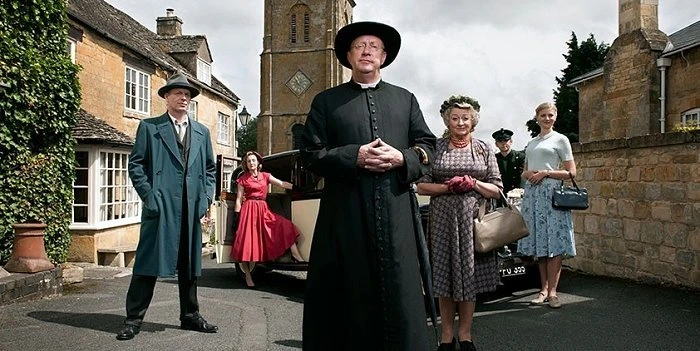
Mrs McCarthy is a great character. Played by Sorcha Cusack in a manner not too far removed from Father Ted's Mrs Doyle, she is a busybody with Father Brown's best interests at heart. Alex Price portrays Sid as a bit of a rough diamond. He has been round the block a few times and can be relied upon to break into the police station's exhibits store when required. Nancy Carroll plays Lady Felicia, a lonely woman reduced by her husband's neglect to hanging round the vestry and eyeing up the men, so she'll do for me. Or she would have done for me if she hadn't been shipped off to Rhodesia early on in Series Five. Lady F has gone there with her husband Monty to administer what would nowadays be called palliative care to the British Empire. She has been replaced by her young niece Bunty who is everything that her name suggests. I'd be willing to bet that her best friends at school are called Beezer, Topper and Whizzer'n'Chips.
It is devoutly to be wished that Bunty suddenly remembers she's got an impending exam on walking about with books on her head, rushes off to finishing school to do some cramming and is never seen again. Sid also left the village at around the same time as Lady Felicia. After unwisely trying to kill those responsible for his year-long incarceration and, perhaps more wisely, deciding that there must be more to life than Mrs McCarthy's bread and butter pudding, he set off to see the world. Come back soon, Sid and Lady F. Father Brown had an extra helper in Susie, a blonde Polish refugee, but she didn't make the cut at the end of Series One. The highlight of her stay was a ludicrous episode involving a radioactive dinner set.
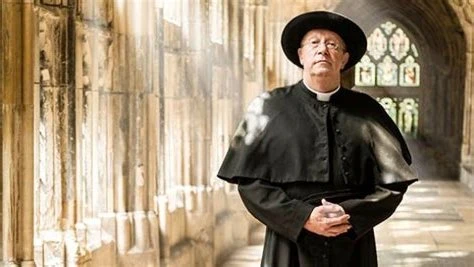
It is fair to say that credibility is not one of the series' strengths. Among the more far-fetched episodes are The Standing Stones, in which ritual sacrifice is used to rid the village of polio. I am not one to point the finger at anyone but, if I were you, I would keep my eye on Mark Benton as the village bobby who has never, ever been seen in the village before this episode. In The Lair of the LibertinesFather Brown and crew are holed up in a country house with a group of hedonists. It is an action-packed episode which delivers a rambling naturist, a drug-laced cake, a Sapphic kiss for Lady F and a chilling finale in which the murderer reveals a bleak and haunting view of human nature. The highlight of the episode is Mrs McCarthy's arch delivery of the words 'The poor Count' as a member of the European aristocracy meets his maker by way of a well-aimed crossbow bolt. It's an unsubtle allusion but, as an exercise in bawdy humour, it's right up there with Shakespeare's country matters and Eric Barker's Carry On induced stupid constable.
I think all the money for this programme must have gone into securing picturesque, televisual surroundings because there doesn't seem to be much left in the budget to pay for extras. I have lost count of the number of christenings, weddings and funerals that have been attended solely by the good Father, Mrs McCarthy and Lady Felicia. I am not asking for Cecil B De Mille style crowd scenes but I don't think a few fresh faces would be out of place on such occasions, particularly at funerals as it would make the life lived seem a little less negligible.
Father Brown has seen off a couple of police inspectors over the course of the series. There is not much to say about Inspector Valentine, other than he was played by Hugo Speer in the style of a man who wished he was elsewhere. He soon got his wish and was replaced by Inspector Sullivan. Tom Chambers shimmied in from Strictly Come Dancing to play him and then shimmied out again as he realised he had other fields of light entertainment to conquer. I am expecting to see Mr Chambers waltzing off with the next Celebrity Bake Off title. He is well overdue a turn on Pointless Celebrities.
The current incumbent of the policing hot seat is Inspector Mallory. He is portrayed by the admirable Jack Deam as a man on secondment from the Keystone Cops. After intense stints on Clocking Off, Coronation Street and DCI Banks, Deam is probably grateful for a bit of light relief and has grabbed it with both hands. The way he lingers over the word Padre, when addressing the good clergyman, shows that he sees the role for what it is and has chosen to run with it. I wish there were more actors like Jack Deam around.
My least favourite episodes of the current canon are those involving Hercule Flambeau. His CV states that he is a master criminal, jewel thief, safe-cracker, pickpocket, fugitive from justice and Father Brown's nemesis. Flambeau means flaming torch in French and the producers probably thought it was a good joke to hire an actor called John Light to play him. Unfortunately, their joke has backfired as Mr Light puts in a low-voltage performance. Flambeau has an impressive back catalogue of villainy but the viewer would never guess it from the evidence on show. Mr Light portrays Flambeau as the type of man for whom the idea of adventure means travelling down to Gloucestershire so that he can let the tyres down on Father Brown's bicycle and then returning home with a self-satisfied smirk. Does anyone know the French for twenty-watt bulb?
The estimable Lorna Watson puts in a good performance as Sister Boniface, the sleuthing nun in the episode The Bride of Christ. Her sterling work is enough to make me forgive that ridiculous Direct Line advert in which she tries to insure her dog. Alas, the talented Ms Watson will have to do a bit more penance before I can pardon her for the disappointment of that sketch show she made with Ingrid Oliver for BBC2 a few years back. I was so looking forward to that. If Ms Watson's comedy career ever turns its face to the wall, she should apply for regular work as Sister Boniface. Her partnership with Father Brown would be an ecclesiastical pairing to rival the great Father Dowling and Sister Steve.
And it doesn't have to stop there. Now that the makers of Inspector Morse have raided his early life to give us Endeavour, and DCI Jane Tennyson can be seen as a humble WPC in 1973, we could have Altar Boy Brown, in which a precocious young Catholic finds out who has been helping himself to the Communion wine and the contents of the collection box. This would be followed by Deacon Brown, in which an idealistic young churchman tries to persuade younger Scottish upstart Deacon Blue that, for the sake of his soul, he should stop releasing those anodyne soft-rock singles and try for something a little edgier.
As this is feel-good television, Father Brown would rise through the ranks until he eventually ends up Pope. The gentle priest would choose a papal name in honour of his favourite TV personality, thus becoming Pope Gilbert Harding (the first and so far, only). Viewers need have no fear that his ascension to the position of Pope would bring an end to his crime-fighting days. He's the big boss now so, if Pope Gilbert Harding wishes to spend his time solving mysteries, that's exactly what Pope Gilbert Harding will do. Who needs GK Chesterton, the attentive listener can hear Ms Flowerday and Mr Guner saying, this stuff writes itself.
Published on February 22nd, 2019. Written by Andrew Cobby 2018 for Television Heaven.


